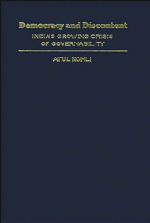Book contents
- Frontmatter
- Contents
- List of tables and figures
- Preface and acknowledgments
- PART I INTRODUCTION
- PART II THE GROWING PROBLEMS OF GOVERNING THE PERIPHERY: POLITICS IN THE DISTRICTS
- PART III ORDER AND BREAKDOWN IN THE STATES
- Introduction: the states
- 8 Breakdown in a “backward” state: Bihar
- 9 Growing turmoil in an “advanced” state: Gujarat
- 10 From breakdown to order: West Bengal
- Conclusion: the states
- PART IV CENTRALIZATION AND POWERLESSNESS AT THE CENTER
- PART V FINAL INFERENCES
- Bibliography
- Index
8 - Breakdown in a “backward” state: Bihar
Published online by Cambridge University Press: 05 June 2012
- Frontmatter
- Contents
- List of tables and figures
- Preface and acknowledgments
- PART I INTRODUCTION
- PART II THE GROWING PROBLEMS OF GOVERNING THE PERIPHERY: POLITICS IN THE DISTRICTS
- PART III ORDER AND BREAKDOWN IN THE STATES
- Introduction: the states
- 8 Breakdown in a “backward” state: Bihar
- 9 Growing turmoil in an “advanced” state: Gujarat
- 10 From breakdown to order: West Bengal
- Conclusion: the states
- PART IV CENTRALIZATION AND POWERLESSNESS AT THE CENTER
- PART V FINAL INFERENCES
- Bibliography
- Index
Summary
Bihar is India's poorest state and one of its most violent. Political killings have become so common in Bihar over the past decade that, according to India Today, they no longer make news. India's leading newspaper, the Times of India, estimated that between 1980 and 1986 there had been more politically motivated murders in Bihar than in Punjab.
Some of that violence has been directed at influencing electoral outcomes. Such violence occurs in bursts and is concentrated in the urban areas. An ongoing, more widespread form of violence is seen in the villages. The primary victims are members of the poor scheduled castes and tribes who may have dared to challenge the age-old patterns of domination. The killers often are members of the landowning castes or their hired thugs, or the police, or some combination of these groups.
As the killings have continued, private caste armies have proliferated. The rise of “warlordism” has generated new types of violence that do not follow the established patterns. Examples of the “forward” castes killing the “backward” or middle castes, of the backward castes killing the forward castes, and of politicized scheduled castes and tribals occasionally killing members of both the forward and the backward castes can all be found. In addition, ordinary criminals, the dacoits, have entered the fray, further confusing the picture of who is killing whom and why.
- Type
- Chapter
- Information
- Democracy and DiscontentIndia's Growing Crisis of Governability, pp. 205 - 237Publisher: Cambridge University PressPrint publication year: 1991
- 2
- Cited by



